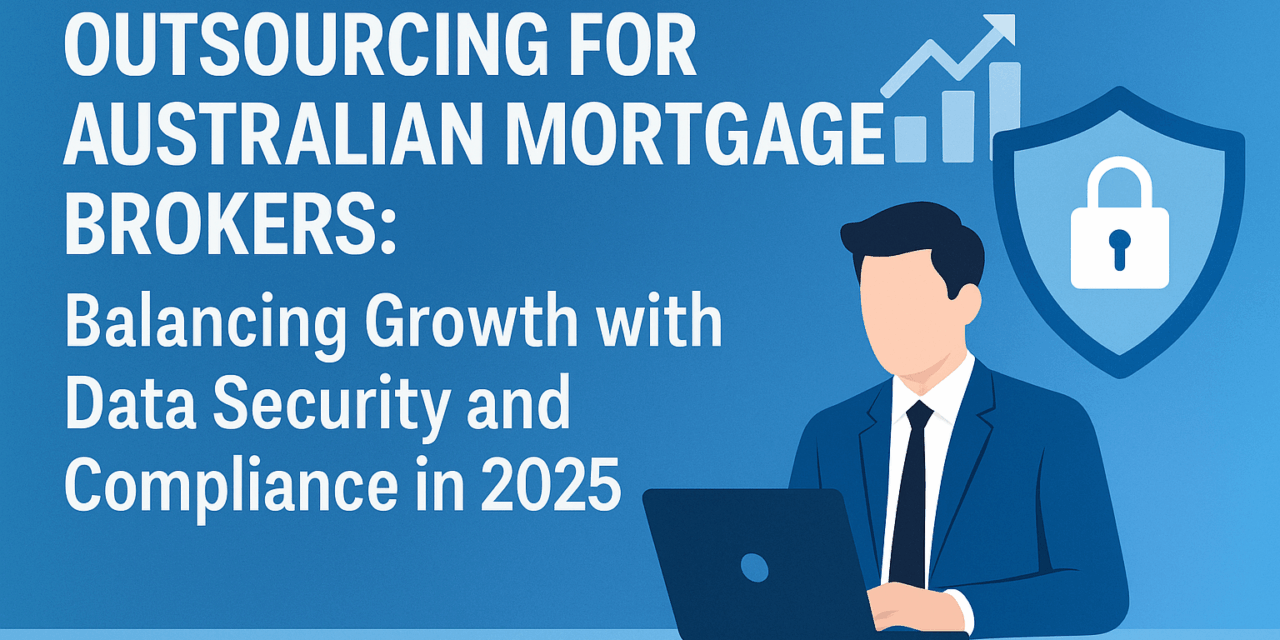Too Busy to Read? We’ve Got You.
Get this blog post’s insights delivered in a quick audio format — all in under 10 minutes.
This audio version covers: Outsourcing for Australian Mortgage Brokers
Outsourcing for Australian Mortgage Brokers: Balancing Growth with Data Security and Compliance in 2025
The Australian mortgage industry is dynamic, with brokers constantly seeking avenues for growth and efficiency. Outsourcing, particularly to offshore teams, has emerged as a compelling strategy to scale operations and alleviate administrative burdens. However, this pursuit of growth introduces significant complexities, especially concerning data security and regulatory compliance. This report delves into the critical balance required for Australian mortgage brokers engaging with offshore teams, addressing mounting concerns around data security, compliance obligations, and recent legal precedents that reshape the landscape for 2025.
In This Report
- The Growth Imperative: Why Outsourcing is on Every Broker's Radar
- The Unseen Risks: Why Data Security is a Top Priority
- Navigating Australia's Regulatory Maze: Privacy & Financial Services
- Lessons from the Front Lines: Recent Legal Precedents & Breaches
- Building a Bulletproof Outsourcing Framework: Best Practices for 2025
- Conclusion: A Path to Secure & Scalable Growth
1. The Growth Imperative: Why Outsourcing is on Every Broker's Radar
Australian mortgage brokers are increasingly exploring offshore outsourcing as a strategic lever to manage administrative burdens and scale their operations. This approach is primarily driven by the desire to free up local teams for higher-value, client-facing activities, fundamentally transforming the broker's role from a hands-on practitioner to a strategic business owner.[1] The aim is to build a "machine" that consistently processes client interactions and loan settlements, rather than relying solely on individual effort.[1]
Outsourcing offers a compelling suite of advantages that contribute to this strategic shift. It can deliver significant cost savings, provide access to a high level of service, offer predictable fixed costs for improved budgeting, and introduce the flexibility to quickly scale staff up or down without substantial upfront investment.[2] Furthermore, it provides access to a pool of top-quality, full-time dedicated staff, enhancing overall operational efficiency and capacity.[2] This embrace of outsourcing is a fundamental component of the "Blueprint" for scaling a brokerage, directly supporting the "Bulletproof Operations" pillar by allowing for role specialization and efficient workflow management.[1]
While cost savings are a tangible and often immediate benefit, the true value of outsourcing for ambitious brokers extends beyond mere expense reduction. The strategic re-focus enabled by outsourcing allows for the reallocation of precious time and expertise. By delegating administrative tasks, internal resources can concentrate on core revenue-generating activities and client relationship building. This directly addresses the common challenge of brokers being "time-starved" and "bogged down by admin".[1, 1] The ability to focus on high-value tasks is essential for achieving ambitious growth targets, such as consistently settling approximately three loans every week of the year to reach a $100 million annual settlement goal. This strategic deployment of resources allows a brokerage to build and refine the operational system that converts qualified leads into settlements, shifting the emphasis from individual hustle to systemic efficiency.[1]
2. The Unseen Risks: Why Data Security is a Top Priority
Mortgage brokers routinely handle an extensive range of highly sensitive personal information. This includes not only basic identification and contact details but also critical financial information, loan account numbers, and, in some cases, even sensitive data like health records or criminal history if voluntarily provided by the client.[3, 4, 5, 6] This wealth of personal and financial data makes brokerages a prime target for malicious actors.
The growing trend of engaging offshore teams, particularly through direct hires without robust enterprise-level IT security, encrypted data storage, and established compliance protocols, creates significant vulnerabilities. This approach has the potential to expose businesses to data breaches and serious legal liabilities under Australian privacy laws, including breaches of the Privacy Act 1988.[7]
A critical and often overlooked risk is the "extended supply chain." The Office of the Australian Information Commissioner (OAIC) explicitly highlights this as a major theme in recent data breaches, noting that large-scale incidents have stemmed from compromises within a supplier's chain.[8] This means that the security posture of an offshore partner, and even that of their subcontractors, is directly intertwined with a brokerage's own compliance and risk exposure. The integrity of the entire data handling process depends on the weakest link in this chain.
Beyond regulatory penalties, data breaches carry severe real-world consequences. These can include financial fraud, identity theft for affected clients, and significant emotional and psychological harm.[9] For the brokerage itself, a breach can lead to substantial reputational damage, erosion of client trust, and a loss of competitive standing. Transparency and an effective response are crucial for mitigating reputational fallout.[9]
There is a notable tension between the perceived benefit of "security of working with someone you can trust" in outsourcing [2] and the explicit warnings about vulnerabilities when engaging offshore teams without proper protocols.[7] This highlights that in the context of sensitive client data, "trust" in an outsourcing relationship cannot be a passive assumption. Instead, it must be actively built through comprehensive due diligence, rigorously verified through contractual agreements, and continuously maintained through ongoing oversight and audits. Relying on blind trust alone presents a dangerous vulnerability. For brokers, this necessitates moving beyond a purely transactional view of outsourcing. The offshore provider must be viewed and managed as a direct extension of the brokerage's own compliance and security posture, requiring the same level of scrutiny and accountability as internal operations.
Furthermore, in an environment where data breaches are becoming more frequent (with over 1,100 incidents reported to the OAIC in 2024[10]), a brokerage that can demonstrably assure its clients of superior data security and compliance, especially concerning its offshore operations, gains a significant competitive advantage. The OAIC emphasizes that transparent and effective data breach response "demonstrates that an entity takes their responsibility to protect personal information seriously, which is integral to building and maintaining trust".[9] Conversely, inadequate security can "destabilise markets and affect trust and confidence in Australia's financial system".[11] This transforms data security from a mere compliance cost into a strategic investment that directly contributes to the "Growth Engine" pillar by fostering a reputation for reliability and integrity.[1] It positions the brokerage as a secure and preferred choice in a sensitive industry.
3. Navigating Australia's Regulatory Maze: Privacy & Financial Services
Operating an Australian mortgage brokerage, particularly with offshore components, requires a meticulous understanding of Australia's complex regulatory landscape, primarily governed by the Privacy Act 1988 (Cth) and ASIC's expectations for financial services licensees.
The Privacy Act 1988 (Cth) & Australian Privacy Principles (APPs)
The Privacy Act 1988 (Cth) serves as Australia's foundational legislation regulating the handling of personal information by most private sector organizations, including mortgage brokers. It establishes comprehensive standards, individual rights, and organizational obligations concerning the collection, use, storage, and disclosure of personal information.[5, 6]
A brokerage's operations are directly governed by the 13 Australian Privacy Principles (APPs) outlined in the Act. Several key principles are particularly relevant to outsourcing:
- APP 1 (Open and Transparent Management): This principle requires entities to manage personal information openly and transparently, including maintaining a clearly expressed and up-to-date privacy policy that covers how information is handled, including any offshore disclosures.[5]
- APP 3 (Collection of Solicited Personal Information): This principle dictates that only personal information reasonably necessary for a brokerage's functions should be collected. Sensitive information, such as health records or criminal history, requires explicit consent from the individual.[5]
- APP 11 (Security of Personal Information): A cornerstone of data protection, APP 11 mandates that entities take "reasonable steps" to protect the personal information they hold from misuse, interference, loss, and unauthorized access, modification, or disclosure. This is fundamental to preventing data breaches.[5, 9]
- APP 8 (Cross-Border Disclosure of Personal Information): This is arguably the most critical principle for offshore outsourcing. Before disclosing personal information to an overseas recipient, a brokerage must take "reasonable steps" to ensure that the overseas recipient handles the data in a manner consistent with the APPs.[12, 13, 14]
- Accountability: Under section 16C of the Privacy Act, the Australian entity (the brokerage) remains fully accountable for any acts or practices of the overseas recipient that would breach the APPs.[13, 14, 15] This means accountability cannot be outsourced.
- Defining "Reasonable Steps": These steps are typically fulfilled by entering into enforceable contractual arrangements with the offshore partner. Such contracts should explicitly require the recipient to comply with the APPs across all aspects of data handling (collection, use, disclosure, storage, destruction/de-identification), include provisions for complaint handling, and mandate a robust data breach response plan that includes prompt notification to the Australian entity.[12, 13, 14] The rigor of these steps must be commensurate with the sensitivity of the data and the potential for harm.[13]
- "Use" vs. "Disclosure" Nuance: While providing data to an offshore contractor is generally considered a "disclosure" (triggering APP 8), it might be classified as a "use" (and thus potentially exempt from APP 8.1's "reasonable steps" requirement) if the Australian entity retains "effective control" over the data. This is typically achieved through a binding contract that strictly limits the overseas provider's purpose to storage and access only, and requires any subcontractors to adhere to the same stringent obligations.[13, 14]
- Consent Exception (High Risk): APP 8.2(b) allows disclosure without taking "reasonable steps" if the entity expressly informs the individual that APP 8 will not apply, and they then consent. However, this means the individual loses their redress rights under the Privacy Act, making it a high-risk approach that should be used with extreme caution.[14, 15]
The Notifiable Data Breaches (NDB) Scheme is an extension of these information governance and security obligations. If a data breach involving personal information is likely to result in serious harm to any affected individuals, the entity is legally obligated to assess the breach within 30 days and notify both the affected individuals and the OAIC.[9, 10]
ASIC's Cyber Resilience Expectations for AFSLs
The Australian Securities and Investments Commission (ASIC) expects Australian Financial Services (AFS) Licensees (which many mortgage brokers either hold or operate under) to move beyond basic cybersecurity (preventative measures) to comprehensive "cyber resilience." This encompasses the ability to anticipate, withstand, recover from, and adapt to adverse cyber incidents.[11, 16]
A brokerage's AFS Licence carries core obligations under the Corporations Act 2001 (Cth) that are directly impacted by its cyber posture:
- Acting efficiently, honestly, and fairly in providing financial services (s912A(1)(a)).
- Having adequate technological resources (s912A(1)(d)).
- Maintaining adequate risk management systems (s912A(1)(h)).
An inability to withstand foreseeable cyber threats or a lack of planning for cyber risks indicates a failure to meet these obligations.[16, 17]
ASIC views cyber resilience as a fundamental governance responsibility, starting with the Board or, for smaller brokerages, the principal. This requires active oversight, informed questioning, and periodic review of the firm's cyber strategy.[16] Furthermore, ASIC explicitly mandates that AFSLs "diligently manage third-party risks" and conduct "thorough security assessments of potential vendors before onboarding them, understanding their security posture and data handling practices".[16, 18] This directly applies to offshore outsourcing. ASIC has highlighted ISO/IEC 27001:2022 as a key benchmark for cybersecurity excellence, expecting licensees to align their policies and risk management frameworks with its principles, particularly regarding identifying critical assets, incident response, third-party risk, and operational resilience.[18]
APRA's CPS 234 (Information Security)
While mortgage brokers are typically not directly regulated by the Australian Prudential Regulation Authority (APRA), their operations are deeply embedded within the broader financial ecosystem. APRA's Prudential Standard CPS 234 (Information Security) sets a high benchmark for information security for APRA-regulated entities (such as banks, insurers, and super funds). Its core objective is to ensure resilience against information security incidents and minimize their impact on information assets, including those managed by related parties or third parties.[19, 20] Although not directly applicable, the principles of CPS 234, particularly its stringent requirements for assessing and overseeing third-party information security capabilities, represent "good practice" for any financial services entity handling sensitive data. Adhering to the spirit of these standards can enhance a broker's reputation, reduce systemic risk across the financial supply chain, and demonstrate "reasonable steps" under the Privacy Act.[19, 20]
The interconnectedness of these regulatory frameworks creates a cascading chain of compliance expectations. The Privacy Act establishes direct accountability for brokers regarding offshore data handling. ASIC's AFS Licence obligations link cyber resilience directly to a broker's legal right to operate. Furthermore, APRA's CPS 234 imposes stringent third-party risk management requirements on the larger financial institutions (lenders, aggregators) with whom brokers partner.[13, 14, 15, 16, 17, 19, 20] This means robust compliance for brokers is not just about avoiding direct penalties but also about maintaining critical business relationships, as lenders and aggregators, themselves bound by strict prudential standards, will scrutinize their partners' third-party risk management. Brokerages must adopt an "enterprise-level" mindset to data security, regardless of their size, anticipating not only their direct regulatory obligations but also the indirect expectations stemming from the broader financial services regulatory landscape. This transforms robust compliance into a prerequisite for strong, trusted, and sustainable partnerships.
The concept of "reasonable steps" under APP 8 is flexible, depending on factors like data sensitivity and potential harm.[13] However, ASIC's increasing emphasis on "cyber resilience" [16], its identification of ISO 27001:2022 as a key benchmark [18], and the OAIC's willingness to take enforcement action (e.g., Medibank[8]) for perceived failures to take "reasonable steps" for large entities, collectively indicate a continuously rising bar for what constitutes adequate protection. What was considered "reasonable" for data security and compliance a few years ago may no longer suffice in 2025. Regulators are increasingly expecting proactive, comprehensive, and continuously improving security measures, especially for sensitive financial data and in light of escalating cyber threats. This means brokerages cannot rely on static security measures or one-off checks. They need to continuously assess their offshore partners' security posture against evolving threats and regulatory expectations, making "ongoing oversight" a critical, dynamic, and iterative process, not a one-time due diligence exercise.[8]
| APP Number & Name | Core Requirement | Relevance to Outsourcing |
|---|---|---|
| APP 1: Open and Transparent Management of Personal Information | Entities must manage personal information openly and have a clear, up-to-date privacy policy. | Requires a brokerage's privacy policy to clearly state if personal information is disclosed offshore, including the types of information and countries involved. |
| APP 3: Collection of Solicited Personal Information | Collect only personal information reasonably necessary for functions; sensitive information requires consent. | Ensures that offshore teams, acting on behalf of the brokerage, only collect necessary data and obtain proper consent for sensitive information. |
| APP 8: Cross-Border Disclosure of Personal Information | Before disclosing personal information overseas, take reasonable steps to ensure the recipient complies with APPs. | Mandates robust contractual agreements and due diligence with offshore providers to ensure they protect data consistent with Australian law. The Australian entity remains accountable for breaches by the overseas recipient. |
| APP 11: Security of Personal Information | Take reasonable steps to protect personal information from misuse, interference, loss, unauthorised access, modification, or disclosure. | Applies to all data held by the brokerage, regardless of where it is processed or stored (onshore or offshore). Requires strong technical and organisational security measures by the offshore partner. |
4. Lessons from the Front Lines: Recent Legal Precedents & Breaches
Recent legal precedents and high-profile data breaches in Australia provide critical lessons for mortgage brokers engaging in outsourcing, particularly concerning the intersection of employment law, data security, and supply chain vulnerabilities.
The Joanna Pascua Case: Employment Law Meets Data Security
In a landmark decision in March 2023, the Australian Fair Work Commission ruled in favor of Joanna Pascua, a Filipino paralegal working remotely for an Australian employer. Despite being classified as an independent contractor, Pascua was found to be an employee and thus entitled to Australian employment protections, including minimum wage and unfair dismissal rights.[7] This case exposed how Australian businesses risk breaching employment laws when they misclassify offshore workers.[7]
While primarily an employment law precedent, this ruling carries significant, albeit indirect, data security implications. If an offshore worker, initially engaged as an independent contractor, is legally reclassified as an employee, the legal framework governing their data handling might fundamentally shift. Independent contractor agreements typically feature specific, robust data protection clauses. Should a court determine an employment relationship exists, the enforceability or applicability of these clauses under employment law could be challenged, potentially weakening the legal recourse available in the event of a data breach or misuse. Furthermore, misclassified workers might perceive less direct accountability or have different incentives regarding adherence to strict data security protocols compared to a professional Business Process Outsourcing (BPO) provider bound by a comprehensive service level agreement. This necessitates that legal review of outsourcing contracts extends beyond merely data privacy clauses to encompass the fundamental classification of the offshore relationship. A truly robust outsourcing strategy requires a holistic legal and operational assessment to prevent unforeseen liabilities.
High-Profile Data Breaches & Supply Chain Vulnerabilities
The Australian landscape has seen a surge in data breaches, with the OAIC's 2024 reports revealing a record 1,113 incidents, and the finance sector accounting for a significant 10% of these.[10] These incidents underscore the pervasive nature of cyber threats and the critical importance of robust security measures.
- Medibank (October 2022): This major cyber attack resulted in the unauthorized access and release of personal information belonging to millions of current and former customers. The OAIC has since initiated civil penalty proceedings against Medibank, alleging that the company failed to take "reasonable steps" to protect personal information from misuse and unauthorized access or disclosure, thereby breaching the Privacy Act.[8] The Medibank case is a stark reminder that "reasonable steps" is a high and evolving bar, particularly for entities handling sensitive and high-volume data. It demonstrates the OAIC's proactive stance and willingness to pursue enforcement action for perceived inadequacies in security frameworks, setting a precedent for all entities, regardless of size.
- HWL Ebsworth Lawyers (2023): The OAIC has opened an investigation into this significant data breach, explicitly highlighting "extended supply chain risks" as a key concern.[8] An illustrative scenario detailed by the OAIC involved client data (including credit card and government identification numbers) being found on the dark web two years after a breach. The root cause was unauthorized access to a legacy database via a developer subcontracted by a third-party supplier, whose credentials were compromised when their personal laptop was repaired overseas. Crucially, the primary entity was unaware of this subcontracting arrangement.[8] This scenario is a critical warning about the inherent risks of sub-contracting within an outsourcing chain. It underscores the necessity of having clear visibility and control over everyone who handles data, even if they are two or more steps removed from the direct contractual partner. A brokerage's data security is inherently tied to the weakest link in its entire supply chain, including any sub-contractors an offshore partner might engage, even if the brokerage is not directly aware of them. This means brokers must demand complete transparency from their primary offshore providers regarding their use of subcontractors. Crucially, they must ensure that all contractual obligations for data security, compliance, and breach notification flow down effectively to every tier of the outsourced operation. This necessitates a multi-layered and continuous due diligence approach.
- Other Financial Sector Breaches (2024): The OAIC's 2024 reports confirm that the threat of data breaches is not theoretical but a pervasive, active, and growing concern specifically targeting the financial sector. Common attack vectors include phishing, compromised credentials, and ransomware, alongside a notable 30% attributed to human error.[10] Other notable incidents in the financial services supply chain include ransomware attacks on Skeggs Goldstien (a financial services firm) and 3P Corporation (a financial services aggregate), breaches affecting super funds like REST and AustralianSuper, and an unpassword-protected database exposing thousands of driver's licenses and bank documents at Fintech company Vroom by YouX. Even a valuer, Herron Todd White, faced bank suspensions after a data breach.[21] These incidents reinforce the understanding that it is not a matter of if a cyber incident will occur, but when. This necessitates proactive, robust security measures and well-rehearsed incident response plans.
| Incident/Company | Date/Year | Type of Breach | Impact/Data Compromised | Key Lesson for Brokers (Outsourcing Focus) |
|---|---|---|---|---|
| Joanna Pascua Case | March 2023 | Employment Misclassification | Legal reclassification of offshore worker from contractor to employee. | Misclassification can undermine contractual data protections; ensure offshore engagement models are legally sound from an employment perspective. |
| Medibank | October 2022 | Cyber Attack (Unauthorized Access) | Personal information of millions of current and former customers released. | "Reasonable steps" for sensitive data is a high and evolving bar; regulators will pursue enforcement for perceived security inadequacies. |
| HWL Ebsworth Lawyers | 2023 | Supply Chain Compromise (Subcontractor) | Client data, including credit card and government ID, found on dark web. | Vulnerabilities extend to subcontractors; demand transparency and flow-down of security obligations to all tiers of the supply chain. |
| Skeggs Goldstien / 3P Corporation | June / May 2025 | Ransomware Attack | Internal documents, customer data published (financial services firms). | Financial sector is a prime target for ransomware; robust backups, incident response, and strong endpoint security are critical. |
| REST / AustralianSuper | April 2025 | Co-ordinated Cyber Attack (Super Funds) | Member data compromised, financial loss to members. | Even large entities are vulnerable; review third-party access to superannuation data and implement strong access controls. |
| Vroom by YouX (Fintech) | April 2025 | Unsecured Database | Thousands of driver's licenses, bank documents, PII exposed. | Dangers of unsecured cloud environments; rigorous configuration management and regular security audits of all digital assets are essential. |
| Herron Todd White (Valuer) | April 2024 | Data Breach (Resulted in bank suspensions) | Employee details compromised, led to operational impact. | Supply chain risks affect business relationships; ensure partners meet lender/aggregator security expectations to avoid indirect impacts. |
5. Building a Bulletproof Outsourcing Framework: Best Practices for 2025
To leverage the benefits of outsourcing while safeguarding client data and ensuring regulatory compliance, Australian mortgage brokers must implement a comprehensive and continuously evolving framework.
Comprehensive Due Diligence: Know Your Partner Deeply
Before entering into any offshore outsourcing arrangement, conducting thorough security assessments of potential vendors is non-negotiable. This goes beyond merely assessing financial viability to deeply understanding their security posture, data handling practices, and internal controls.[16, 22] A robust due diligence process should include corporate background checks, identity confirmation of key personnel, commercial credit history, and, most critically, a detailed evaluation of their information security capabilities and compliance frameworks.[19, 20, 22, 23] This assessment should be tailored to the volume and sensitivity of the data they will handle. The primary purpose of due diligence is to identify and assess potential risks early in the process, enabling informed decisions and the implementation of mitigation strategies before issues arise.[23] ASIC explicitly requires this for AFSLs.[16]
Robust Contractual Agreements: Your Shield of Accountability
The contract with an offshore provider is the primary legal tool for ensuring compliance and accountability. It must be meticulously drafted to explicitly require the recipient to handle personal information in accordance with all relevant Australian privacy laws, particularly the APPs.[13, 14] Key contractual elements include:
- Scope of Services & Data: Precisely define the types of personal information to be shared and the exact, limited purposes for which it can be used.[8, 13]
- APP Compliance: Mandate explicit adherence to all relevant APPs (especially APP 8 and APP 11) for every stage of data handling: collection, use, disclosure, storage, and secure destruction or de-identification.[13, 14]
- Subcontracting Controls: Include a clear contractual obligation for the third-party provider to notify the brokerage and obtain express consent before engaging any subcontractors for jointly held personal information. Ensure that any approved subcontractors are bound by the same stringent data protection obligations.[8, 13]
- Data Retention & Destruction: Specify clear clauses on how long data can be held, and mandate secure methods for its destruction or de-identification when it is no longer required.[8]
- Data Breach Accountability & Notification: Define clear accountabilities for data breaches, including who is responsible for assessing harm, providing necessary information, and promptly notifying affected individuals and the OAIC. The contract must include mechanisms for immediate notification of any suspected or confirmed incidents.[8, 13]
- Audit Rights: Include robust provisions allowing the brokerage to conduct regular audits and security assessments of the offshore provider's systems, processes, and compliance with contractual terms.[8, 12]
- Governing Law: Explicitly state that Australian law will govern the contract, ensuring legal enforceability within the Australian jurisdiction.
| Clause Category | Specific Clause | Importance for Brokerages |
|---|---|---|
| Data Protection & Privacy | Compliance with APPs | Ensures overseas recipient adheres to Australian privacy law, mitigating legal risk. |
| Scope of Data Use | Limits how offshore team can use client data, preventing unauthorised secondary uses. | |
| Sensitive Information Handling | Specifies enhanced safeguards for highly sensitive data, reducing risk of severe harm. | |
| Accountability & Liability | Subcontracting Approval | Requires consent for subcontractors, extending security oversight to the full supply chain. |
| Data Breach Notification Protocol | Mandates immediate notification of incidents, enabling timely response and NDB scheme compliance. | |
| Indemnification | Protects the brokerage from financial losses incurred due to the provider's data breaches or non-compliance. | |
| Operational & Security | Security Measures Mandate | Requires specific technical and organisational security controls (e.g., encryption, MFA) to protect data. |
| Data Retention & Destruction | Ensures data is not held indefinitely and is securely disposed of when no longer needed. | |
| Audit & Termination | Audit Rights | Allows the brokerage to verify ongoing compliance and security posture through regular checks. |
| Data Return/Destruction on Termination | Guarantees secure return or verifiable destruction of all client data upon contract conclusion. |
Implementing Technical Safeguards: The Digital Fortification
Robust technical measures are essential to protect client data. All personal and sensitive data, both when in transit (e.g., during transfer) and at rest (e.g., stored on servers), must be protected with strong encryption protocols. More sensitive information may require additional, higher-grade safeguards.[12] Only secure and verified methods for transferring data between the brokerage and the offshore team should be utilized, actively avoiding insecure channels such as unencrypted email attachments.[12]
Strict access controls must be implemented, limiting access to sensitive systems and data to only those individuals who absolutely require it for their roles. Multi-Factor Authentication (MFA) should be mandatory for all users accessing systems, providing an essential layer of defense against compromised or stolen credentials.[10, 16] All critical data should be regularly backed up, with these backups stored securely, ideally offline or in a disconnected environment, to enable rapid recovery from incidents like ransomware attacks.[16] A rigorous schedule for promptly patching operating systems, applications, and all software is necessary to close known security vulnerabilities that could be exploited by attackers.[16] Regular, comprehensive system audits should be conducted to proactively identify and address any security weaknesses or non-compliance.[12]
Internal Controls & Team Training: Cultivating a Security-First Culture
A fundamental principle of bulletproof operations is that if a process isn't written down, it doesn't exist. Documenting every single step of the loan process, from initial client contact to post-settlement, explicitly detailing how data is handled, by whom (both internal and external), and the security protocols at each stage, is crucial.[1] While delegating tasks to specialists (including offshore teams) is key for scalability, every role, regardless of location, must clearly understand its specific responsibilities regarding data security and privacy.[1] All staff, both local and offshore, must undergo regular and comprehensive training on their legal obligations under the APPs, the brokerage's internal security policies, and best practices for data protection. This training should cover both technical and contractual aspects.[12] While automated updates to clients are efficient, it is important to ensure that the systems used for such communications are inherently secure and compliant with privacy regulations.[1] Strict data entry standards from day one should be enforced to maintain consistent, complete, and accurate client data, as poor data hygiene can compromise marketing automation and compliance efforts.[1]
Ongoing Oversight & Auditing: Continuous Vigilance
Continuous vigilance is paramount. Periodic and thorough risk assessments of all cross-border data sharing activities should be conducted. This involves understanding precisely what personal information is being shared, with whom, and for what specific purpose, to identify emerging risks.[12] A robust, ongoing framework for managing third-party providers must be implemented. This includes regular cybersecurity assessments and audits to continuously evaluate the design and operating effectiveness of their controls and confirm their compliance with security standards, contractual requirements, and legal obligations.[8] Finally, comprehensive plans to respond to plausible information security incidents must be developed and regularly tested. These plans must detail specific procedures for each phase of an incident: detection, analysis, containment, eradication of the cause, and recovery of systems and business operations. Crucially, these plans must clearly identify the roles and responsibilities of all personnel involved in managing a data breach, both internal and external.[9, 16, 19]
The initial perceived benefit of outsourcing includes "security of working with someone you can trust".[2] However, the stringent requirements of APP 8 [13, 14], ASIC's s912A obligations [16], APRA's CPS 234 [19, 20], and the lessons from major data breaches like Medibank and HWL Ebsworth [8] collectively demand a profound shift. Trust can no longer be implicit; it must be verifiable and demonstrable. Due diligence [16, 22] and robust contractual agreements [13, 14] are the primary mechanisms for achieving this verifiable assurance. In 2025, truly "trusting" an offshore partner means having the documented evidence, contractual leverage, and audit capabilities to prove their continuous adherence to Australian data security and privacy standards. This signifies confidence backed by control. This significantly elevates the role of specialized legal counsel and cybersecurity experts in the outsourcing procurement and ongoing management processes. Brokerages need to invest strategically in these areas to transform perceived trust into legally defensible and operationally robust security, turning compliance into a competitive advantage.
The "Blueprint" for scaling a brokerage explicitly emphasizes building "Bulletproof Operations" founded on "documented processes and run by specialized people".[1] Simultaneously, regulatory requirements (e.g., APP 1 for transparency, APP 11 for security) demand rigorous data handling. These are not isolated legal checkboxes; they are operational mandates. For example, automating client onboarding [1] can also ensure the timely provision of privacy notices (APP 1). Compliance is not a separate, burdensome task to be completed after operational processes are designed. Instead, it is an integral, foundational element of building scalable, efficient, and resilient operations. By embedding compliance directly into daily workflows, checklists, and system design, it becomes a natural and seamless part of the "loan factory" process. This integrated approach allows brokerages to achieve both operational efficiency and robust security simultaneously, transforming compliance from a potential "bottleneck" into a powerful enabler for sustainable growth and a key competitive differentiator.[1]
6. Conclusion: A Path to Secure & Scalable Growth
The journey to successfully scaling an Australian mortgage brokerage in 2025 is fundamentally a dual imperative. It hinges on the ability to effectively leverage the growth-enabling benefits of outsourcing while simultaneously embedding robust data security and unwavering regulatory compliance into every facet of operations.
This requires a profound and fundamental shift in mindset. The role of a brokerage principal evolves from merely being a broker who does all the work to becoming a strategic business owner who builds the system that does the work.[1] In this new paradigm, security and compliance are not burdensome afterthoughts but foundational elements that underpin the entire operational structure.
By proactively addressing data security and compliance concerns with offshore teams, brokerages achieve far more than just mitigating risks and avoiding costly legal pitfalls. They build a stronger, more trustworthy brand in the market. This proactive approach enables them to attract and retain discerning clients who value privacy, secure valuable partnerships with lenders and aggregators who demand high security standards, and ultimately achieve truly sustainable, scalable growth.
The regulatory landscape, particularly around privacy and cyber resilience, will continue to evolve, and cyber threats will only become more sophisticated. Continuous vigilance, ongoing education, and a steadfast commitment to adapting outsourcing frameworks and security protocols are essential to staying ahead of the curve and safeguarding the future of the brokerage.
Conclusion: From Practitioner to Architect
The journey from current revenue to $100M in annual settlements is not about more hustle. It is a strategic transformation from being a broker who does all the work to a business owner who builds the system that does the work. This requires a fundamental shift in mindset. The goal is no longer to be the best practitioner; it is to be the best architect.
The blueprint is clear. It rests on three interconnected pillars: a Growth Engine that consistently attracts ideal clients, Bulletproof Operations that convert them with ruthless efficiency, and a Modern Tech Stack that provides the leverage to make it all possible. By focusing on building this system, the industry's biggest challenges are solved, its most common traps are avoided, and a valuable, scalable asset is created. The data is clear. The plan is here. Now is the time to stop being just a broker and start being the architect of the future. Stay sharp.
Get More Insights





